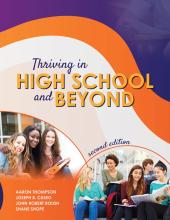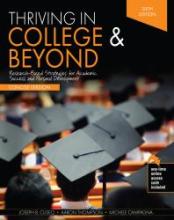Search Results: 11 - 20 of 6898
display
about product
Service Management Principles for Hospitality and Tourism in the Age of Digital Technology
Author(s): Jay Kandampully, David Solnet, Anil Bilgihan
Service Management Principles for Hospitality & Tourism in the Age of Digital Technology was developed through many years of teaching service management mainly to hospitality and tourism management students. This edition ensures that the content of this book remains current and includes references a...about product
Thriving in High School and Beyond: Strategies for Academic Success & Personal Development
Author(s): Joseph B Cuseo, Aaron Thompson, Shane Shope, John Roush
Thriving in High School and Beyond: Strategies for Academic Success & Personal Development Equips students with a comprehensive set of specific, action-based strategies that identifies what to do to succeed in high school and beyond, accompanied by compelling reasons why to do itFocuses on the stude...Learning About Dance: Dance as an Art Form and Entertainment
Author(s): Nora Ambrosio
New Ninth Edition Now Available!Learning about Dance: Dance as an Art Form and Entertainment introduces students to the exciting, daring, ever-changing, and dynamic world of dance.Learning about Dance invites readers to experience the artistry and excitement of the dance world. The publication prese...Cruise Ship Management and Leadership: Hospitality on the High Seas
Author(s): Frederick DeMicco, Ryan Wootten
Cruise Ship Management & Leadership provides students with an integrated approach to learning the basics of Cruise Ship Management and cruise career opportunities. Students will receive an overview of the cruise ship management environment, the functional areas of cruise ship management, including m...about product
Thriving in College and Beyond: Research-Based Strategies for Academic Success and Personal Development: Concise Version
Author(s): Joseph B Cuseo, Aaron Thompson, Michele Campagna
Thriving in College & Beyond: Research-Based Strategies for Academic Success and Personal Development covers the full range of topics and issues that impact student success. Content is delivered through a variety of educational formats and learning modalities, including snapshot summaries, concept m...about product
Thriving in College and Beyond: Research-Based Strategies for Academic Success and Personal Development
Author(s): Joseph B Cuseo, Aaron Thompson, Michele Campagna
Thriving in College & Beyond: Research-Based Strategies for Academic Success and Personal Development covers the full range of topics and issues that impact student success. Content is delivered through a variety of educational formats and learning modalities, including snapshot summaries, concept m...Content Area Literacy
Author(s): Jerry Johns, Paula Di Domenico, Rachel Lesinski-Roscoe
Content Area Literacy: Toolkit of Disciplinary Strategies for Middle and High School considers various professionals who may find its content useful:professors teaching a content area or disciplinary literacy coursemiddle and high school teachers working directly with students literacy and instructi...about product
Thriving in the Community College and Beyond: Research-Based Strategies for Academic Success and Personal Development
Author(s): Joseph B Cuseo, Aaron Thompson, Julie McLaughlin
Thriving in the Community College & Beyond covers the full range of topics and issues that impact student success. Content is delivered through multiple formats and learning modalities, including snapshot summary boxes, concept maps, content-relevant cartoons, inspiring quotes from successful studen...Global Enterprise: The Theory & Practice of International Business
By: Eugene Paul Kim, Roger Philips, Stanley Klatka, Jonathan Opata, Virginia A Suveiu, Robert Austin
about product
Global Enterprise: The Theory & Practice of International Business
Author(s): Eugene Paul Kim, Roger Philips, Stanley Klatka, Jonathan Opata, Virginia A Suveiu, Robert Austin
Global Enterprise – Theory and Practice is a multi-authored textbook on international business providing an alternative to the standard, bland, encyclopedic international business textbooks on the market today. The emphasis here is on teaching students usable skills and knowledge in the context of ...The Dark Web: Unfiltered
Author(s): Scott H. Belshaw
In The Dark Web: Unfiltered, Dr. Scott Belshaw takes you into an online world that very few have encountered. This book serves as a proverbial travel guide into the sick and twisted side of the dark web, including hidden coves for illegal activity. These areas include the dark web drug scene, hiring...








